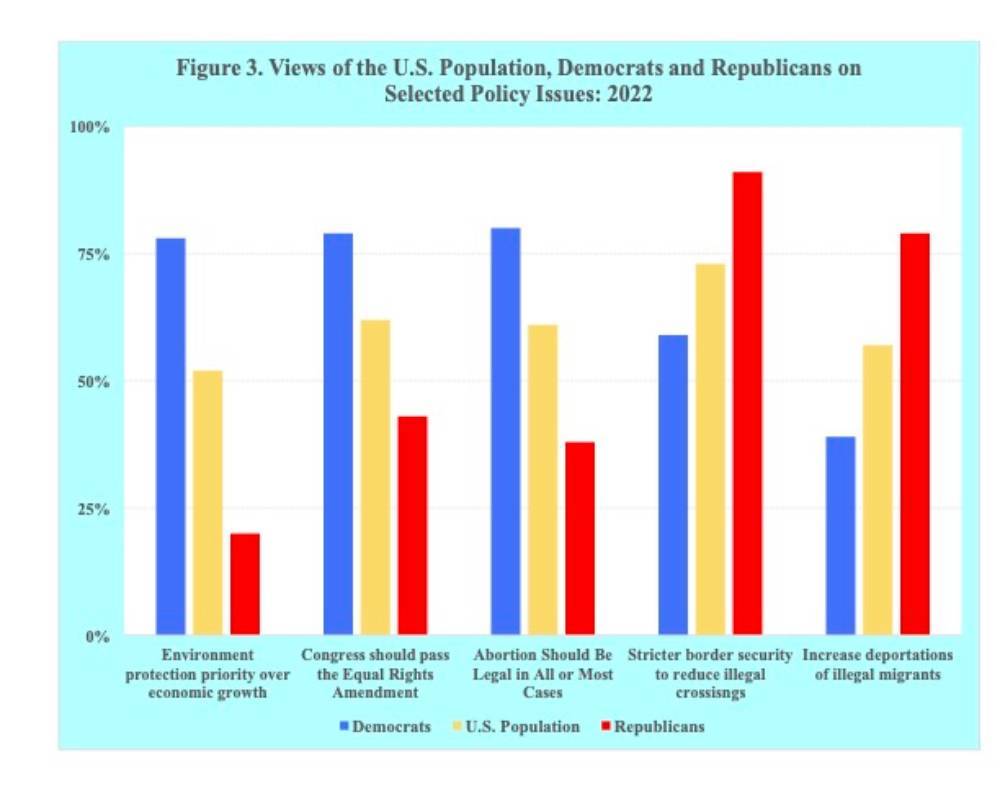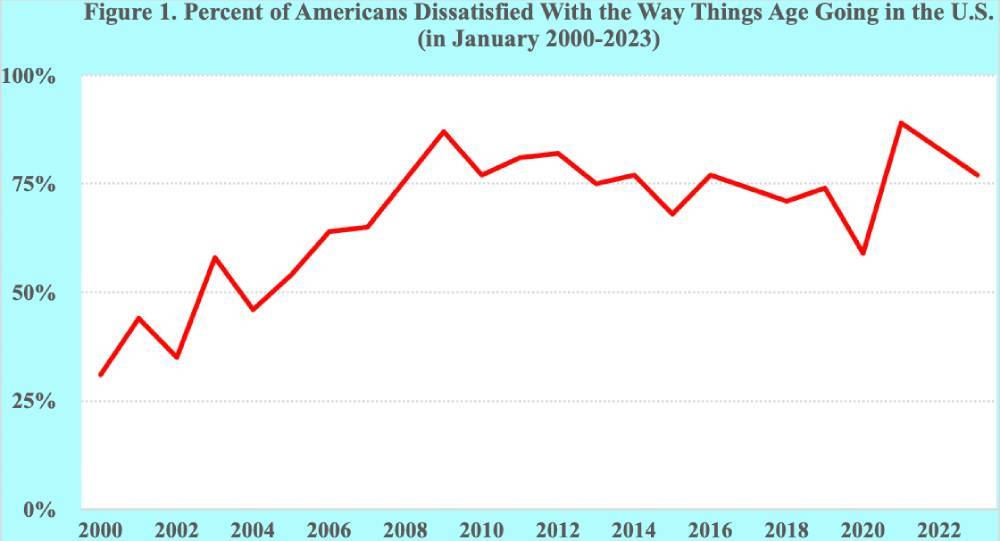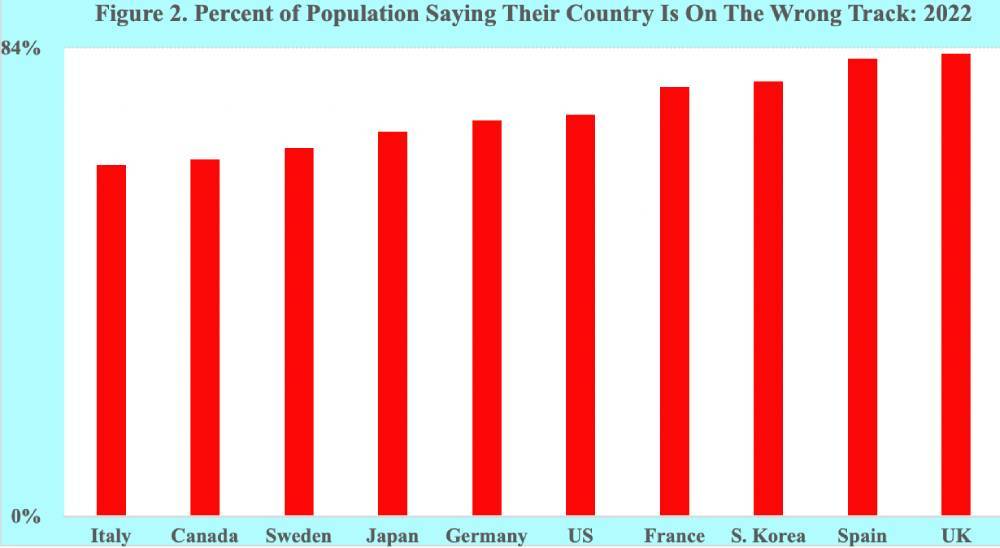According to most U.S. national opinion polls, the large majority of American adults, typically no less than two-thirds, say the country is on the wrong track.
However, asking whether the United States is on the right or wrong track is the wrong question to ask Americans insofar as it invariably elicits a pessimistic response.
The “wrong track” view on the state of the nation held by a majority of Americans has largely prevailed over the past several decades. Opinion pollsters have generally found Americans saying that the country is on the wrong track.
The finding by polls about the direction of the country doesn’t provide much information other than it’s not on the right track. Moreover, that question is rarely followed up with what should be the right track for the United States, probably because little consensus exists among Americans on what the right track is.
Since the start of the 30-year-plus history of the NBC News surveys, the results invariably report that the majority of Americans are dissatisfied with the country’s direction. The recent June NBC News opinion poll found that nearly 3 out of 4 American adults believe the country is on the wrong track.
Similarly, Gallup polls over the past 23 years have found that by and large the majority of Americans are dissatisfied with the way things are going in the country. The recent June Gallup national poll reported that 81 per cent of Americans expressed dissatisfaction with the direction of the country (Figure 1).
A partisan divide certainly exists between Democrats and Republicans over the direction of the country. However, according to an NBC News national poll taken at the start of the year, only minorities of Democrats and Republicans believed that the country is headed in the right direction, approximately 40 and 10 percent, respectively.
Despite the partisan divide, poll after poll continues to find that the large majority of American adults remain broadly pessimistic about the direction the nation is heading, believing that America is on the wrong track.
That dominant wrong-track view about the state of the nation is not limited to Americans. According to overseas opinion polls in 2022, large majorities of the adult populations in many wealthy developed countries also felt that their country’s current trajectory was on the wrong track.
The proportions of the adult populations saying their nation was on the wrong track ranged from about 66 per cent in Canada, Italy and Sweden to approximately 80 per cent in South Korea, Spain and the United Kingdom. In between those two groups, at about 70 per cent, were the populations of Germany, Japan and the United States (Figure 2).
Given its usual negative response, asking whether the country is on the right or wrong track is uninformative and meaningless, with little specificity as to what is actually being measured. Some have concluded that relying on such a polling question to assess the country’s political temperature and likely fortunes of elected leaders is absurd.
Given that the question regarding the direction of the country typically results in a large majority saying it’s on the wrong track, one wonders why U.S. national polls continue to ask Americans that question.
A possible reason for continuing to ask that question is the statistical inertia of opinion polls, which have been asking Americans about the right or wrong direction of the country for decades. In addition, opinion pollsters and their collaborators in major U.S. news agencies have a strong desire for a succinct, easily understood measure to describe the overall view of Americans toward the governing administration.
However, rather than providing a meaningful assessment of the public’s political temperature, the omnipresent message that the country is on the wrong track provides a cudgel to wield against political opponents, especially the ruling party. Whenever administration officials and their supporters attempt to adopt or support policies, programs and guidelines, the political opposition responds with the repeated claim that the majority of American voters believe the country is on the wrong track.
Rather than asking the public the right or wrong track question, opinion polls should focus on the views of Americans regarding specific vital programs, policies and issues, which is likely to yield results that are informative, meaningful and policy-relevant. Such polls would also offer some possible insight into the political fortunes of elected officials on specific issues.
Certainly, one critical issue facing America concerns the environment. A recent Gallup opinion poll reported that a majority of American adults, 52 per cent, believe environmental protection should be a higher priority for the country than economic growth (Figure 3).
 Source: National opinion polls
Source: National opinion polls
That poll also found a large partisan divide prevailing across the country with 78 percent of Democrats versus 20 percent of Republicans saying environmental protection should be given priority over economic growth. Past Gallup polls found that while the two political parties expressed similar views on the environment from 1984 to the early 1990s, since then the partisan divide has become evident and has gradually expanded.
Opinion polls are also reporting that the Republican position regarding the environment has a significant age divide. A recent 2023 PEW poll found that while 64 per cent of Republicans over 65 years opposed the U.S. taking steps to become carbon neutral, 67 per cent of Republicans under 30 years supported doing so.
Another vital issue facing America is the Equal Rights Amendment (ERA). The ERA, which is a proposed amendment to the U.S. Constitution that guarantees equal rights for women, has been ratified by 38 U.S. states.
According to a 2022 national opinion poll, the majority of Americans, 62 per cent, believe Congress should adopt the ERA. Again, a major partisan divide separates Americans on this important issue. While a large majority of Democrats, 79 per cent, is in favor of the Congressional adoption of ERA, a minority of Republicans, 43 per cent, support the ERA’s adoption.
Certainly, the question of abortion remains an important and controversial issue across the United States. A majority of Americans, 61 per cent, say abortion should be legal in all or most cases.
However, again significant partisan views concerning abortion divide the U.S. population. While a majority of Democrats, 80 per cent, believe abortion should be legal in all or most cases, a minority of Republicans, 38 per cent, have that position.
A fourth important issue facing America concerns illegal immigration. According to a 2022 poll by the Pew Research Center, 73 per cent of Americans said increasing security along the U.S.-Mexico border to reduce illegal crossings should be an important goal of America’s immigration policy.
While that poll reported a partisan divide regarding reducing illegal border crossings, the majority of members in both parties favored stricter border control to reduce illegal crossings. Nearly all Republicans, about 91 per cent, said border security should be an important goal, with a smaller majority of Democrats, 59 per cent, favored that position.
Regarding the related issue of deportations of immigrants illegally residing within the country, the PEW opinion poll reported a large partisan divide. While a large majority of Republicans, 79 per cent, said increasing deportations of immigrants currently in the country illegally is important, the proportion of Democrats having that view was a minority of 39 per cent.
In sum, at least over the past several decades, asking Americans whether the country is on the right or wrong track is the wrong question as it invariably elicits a dissatisfied response. The results of national opinion polls would be more insightful and relevant to policymaking if polls focused on questions assessing the views of Americans on the many important issues facing the country.

















